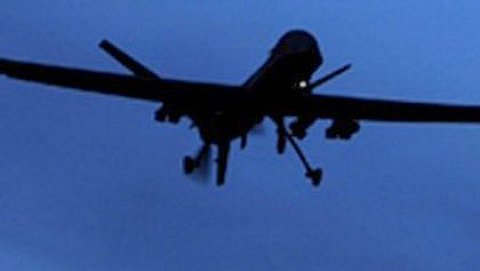Archives
November 4, 2011
That "Fragile" Relationship
Apparently large drone strikes are damaging our "fragile" relationship with Pakistan, although never mind that Pakistan's duplicity is damaging their relationship with us (see piece below).
Many U.S. officials are "privately" arguing that the CIA pays too little attention to the "diplomatic costs of air strikes that kill large groups of low-level fighters." First of all, why privately? And second of all, the CIA and the Pentagon should be focusing their attention on our security, not whether or not the Pakistani public loves us (which they don't, with or without drone strikes).
If Pakistan wants drone strikes to stop, then Pakistan itself should go after these targets, be they "low-level" or not. To that end, what better incentive for them than these strikes, which appear to be grating on their nerves?
As for the State Department's concerns that all this comes at a time when the're trying to "enlist Pakistan's help in advancing peace talks with the Taliban, a key element of a White House drive to end the war in neighboring Afghanistan," all we can say is: Peace talks with the Taliban...you have got to be kidding?!
FoxNew.com/The Wall Street Journal | November 3, 2011
U.S. Tightens Drone Rules After Diplomatic Officials Say Strikes Damage U.S. Relationship With Pakistan

January 31, 2010: A U.S. Predator drone flies over the moon above Kandahar Air Field,
southern Afghanistan. AP Photo.
WASHINGTON – The Central Intelligence Agency has made a series of secret concessions in its drone campaign after military and diplomatic officials complained large strikes were damaging the fragile U.S. relationship with Pakistan.
The covert drones are credited with killing hundreds of suspected militants, and few U.S. officials have publicly criticized the campaign, or its rapid expansion under President Barack Obama. Behind the scenes, however, many key U.S. military and State Department officials demanded more-selective strikes. That pitted them against CIA brass who want a free hand to pursue suspected militants.
The disputes over drones became so protracted that the White House launched a review over the summer, in which Mr. Obama intervened.
The review ultimately affirmed support for the underlying CIA program. But a senior official said: "The bar has been raised. Inside CIA, there is a recognition you need to be damn sure it's worth it."
Among the changes: The State Department won greater sway in strike decisions; Pakistani leaders got advance notice about more operations; and the CIA agreed to suspend operations when Pakistani officials visit the U.S.
The Pakistan drone debate already seems to be influencing thinking about the U.S. use of drones elsewhere in the world. In Yemen, the CIA used the pilotless aircraft in September to kill American-born cleric Anwar al-Awlaki, a suspected terrorist. But the White House has for now barred the CIA from attacking large groups of unidentified lower-level militants there.
The CIA concessions were detailed by high-level officials in a series of interviews with The Wall Street Journal. But in a measure of the discord, administration officials have different interpretations about the outcome of the White House review. While some cast the concessions as a "new phase" in which the CIA would weigh diplomacy more heavily in its activities, others said the impact was minimal and that the bar for vetting targets has been consistently high.
"Even if there are added considerations, the program-which still has strong support in Washington-remains as aggressive as ever," said a U.S. official.
Last year, Mr. Obama expanded the CIA program to 14 drone "orbits." Each orbit usually includes three drones, sufficient to provide constant surveillance over tribal areas of Pakistan. The CIA's fleet of drones includes Predators and larger Reapers. The drones carry Hellfire missiles and sometimes bigger bombs, can soar to an altitude of 50,000 feet and reach cruise speeds of up to 230 miles per hour.
The drone program over the past decade has moved from a technological oddity to a key element of U.S. national-security policy. The campaign has killed more than 1,500 suspected militants on Pakistani soil since Mr. Obama took office in 2009, according to government officials.
To some degree, the program has become a victim of its own success. Critics question whether aggressive tactics are necessary following the eradication of senior Al Qaeda leaders in Pakistan, including Usama bin Laden, killed in a helicopter raid by Navy Seals in May after drone and satellite surveillance of the compound where he was living.
Many officials at the Pentagon and State Department privately argued the CIA pays too little attention to the diplomatic costs of air strikes that kill large groups of low-level fighters. Such strikes inflame Pakistani public opinion. Observers point to the rising power in Pakistan of political figures like Imran Khan, who held large rallies to protest the drones and could challenge the current government.
All this comes at a time when the State Department is trying to enlist Pakistan's help in advancing peace talks with the Taliban, a key element of a White House drive to end the war in neighboring Afghanistan. Top officials of the CIA, Pentagon, State Department and National Security Council have been pulled into the debate. Among those voicing concerns was Gen. David Petraeus, who commanded the war in Afghanistan before becoming CIA director in September. A senior intelligence official said Gen. Petraeus voiced "caution against strikes on large groups of fighters."
To read more on this story, see The Wall St. Journal article here.
Original FoxNews article here.
Log In »
Notable Quotables
"Mr. Netanyahu is one of the most media-savvy politicians on the planet. On Friday he appeared live via video link on 'Real Time with Bill Maher,' taking the host’s alternately sardonic and serious line of questioning with gazelle-like alacrity."
~ Anthony Grant, jourrnalist who has written for many major newspapers and worked in television at Paris and Tel Aviv, interviewing former PM Benjamin Netanyahu on Monday, at the outset of Mr. Netanyahu's new book (more here).


